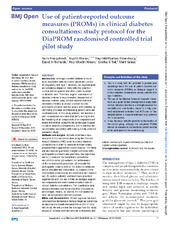| dc.contributor.author | Haugstvedt, Anne | en_US |
| dc.contributor.author | Hernar, Ingvild | en_US |
| dc.contributor.author | Strandberg, Ragnhild Bjarkøy | en_US |
| dc.contributor.author | Richards, David A | en_US |
| dc.contributor.author | Nilsen, Roy Miodini | en_US |
| dc.contributor.author | Tell, Grethe S. | en_US |
| dc.contributor.author | Graue, Marit | en_US |
| dc.date.accessioned | 2019-05-29T08:01:28Z | |
| dc.date.available | 2019-05-29T08:01:28Z | |
| dc.date.issued | 2019 | |
| dc.Published | Haugstvedt A, Hernar I, Strandberg RØ, Richards DA, Nilsen RM, Tell GST, Graue M. Use of patient-reported outcome measures (PROMs) in clinical diabetes consultations: study protocol for the DiaPROM randomised controlled trial pilot study. BMJ Open. 2019;9:e024008 | eng |
| dc.identifier.issn | 2044-6055 | |
| dc.identifier.uri | https://hdl.handle.net/1956/19792 | |
| dc.description.abstract | Introduction: Although diabetes distress is found to be associated with decreased glycaemic control among adults with type 1 diabetes, the psychological and emotional impact of living with the condition is often not recognised and often under-reported in diabetes care. Therefore, regular assessment of diabetes distress is recommended. Assessment of diabetes distress using patient-reported outcome measures (PROMs) in clinical practice has the potential to enhance care for people with diabetes by identifying problems and improving patient–clinician communication. In this study protocol, we describe a pilot randomised controlled trial (RCT) aiming to test the feasibility of all components of an empowerment-based intervention using PROMs as dialogue support in clinical diabetes consultations, and to address the uncertainties associated with running a fully powered evaluation study. Methods: and analysis We will undertake a two-arm pilot RCT of an intervention using the Problem Areas In Diabetes (PAID) scale in clinical diabetes consultations in order to conclude whether a fully powered trial is appropriate and/or feasible. The study will also include qualitative indepth interviews with participants and healthcare providers. Our objectives are to (1) evaluate the recruitment procedures and attrition rates; (2) evaluate the performance of the randomisation procedure; (3) evaluate the participants’ mean scores on the outcome measures before and after the intervention; (4) evaluate if the intervention consultations are acceptable and feasible; and (5) explore patients’ and healthcare providers’ experiences with the use of PAID as dialogue support and empowerment-based communication skills in clinical diabetes consultations. The quantitative data analysis includes descriptive statistics (frequencies, percentages, means, SD and CI). For the qualitative data, we will perform thematic analysis. Ethics and dissemination: Ethical approval has been obtained from the Western Norway Regional Committee for Medical and Health Research Ethics (2017/1506/REC west). We will present the findings from the study phases at national and international conferences and submit manuscripts to peer-reviewed journals and popular science journals. | en_US |
| dc.language.iso | eng | eng |
| dc.publisher | BMJ | eng |
| dc.rights | Attribution CC BY-NC | eng |
| dc.rights.uri | http://creativecommons.org/licenses/by-nc/4.0/ | eng |
| dc.title | Use of patient-reported outcome measures (PROMs) in clinical diabetes consultations: study protocol for the DiaPROM randomised controlled trial pilot study | en_US |
| dc.type | Peer reviewed | |
| dc.type | Journal article | |
| dc.date.updated | 2019-01-22T08:15:35Z | |
| dc.description.version | publishedVersion | en_US |
| dc.rights.holder | Copyright 2019 The Author(s) | |
| dc.identifier.doi | https://doi.org/10.1136/bmjopen-2018-024008 | |
| dc.identifier.cristin | 1660470 | |
| dc.source.journal | BMJ Open | |
| dc.identifier.citation | BMJ Open. 2019, 9, e024008. | |

